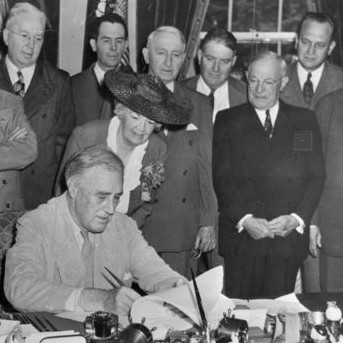(Editor’s note: Here’s a bit of history, partly from The American Presidency Project. It forms a distinctive report on how Georgia politics worked years ago. So enjoy today’s political history lesson of Georgia. –eeb)
By Elliott Brack
Editor and Publisher, GwinnettForum
BARNESVILLE, Ga. | At the celebration dedicating a new Lamar Electric Membership Cooperative here on Aug. 11, 1938, there were 50,000 people in attendance for the opening of the electric co-op.
![]() Lamar EMC began with 357 members, 144 miles of power line, and two employees. It now employs 64 people and serve more than 16,000 members in nine counties: Bibb, Coweta, Crawford, Lamar, Meriwether, Monroe, Pike, Spalding, and Upson. Today it is operating under a new name, Southern Rivers Energy, changing the name from Lamar EMC in 2005.
Lamar EMC began with 357 members, 144 miles of power line, and two employees. It now employs 64 people and serve more than 16,000 members in nine counties: Bibb, Coweta, Crawford, Lamar, Meriwether, Monroe, Pike, Spalding, and Upson. Today it is operating under a new name, Southern Rivers Energy, changing the name from Lamar EMC in 2005.
That August was a big day for Georgia, since President Franklin Delano Roosevelt came to throw the switch to send electricity to the county. Also on stage were three candidates for the U.S. Senate, the incumbent Sen. Walter F. George of Vienna, former Gov. Eugene Talmadge of McRae, and Walter Lawrence Camp of Atlanta, who was a former state attorney general and Federal District Judge. Also on the platform was Georgia’s governor, Ed Rivers.
The “staged meeting” was inherently confrontational, a fact that had been advertised, and it was in the expectation of exciting theater that most of the vast throng had come.

Roosevelt signs the GI Bill in 1944. George is standing behind the U.S. Rep. Edith Rogers, R-Mass., and has a handkerchief in his pocket. Photo via U.S. Senate.
FDR spoke of the South’s economic problems and urged Georgia voters to send liberals to Washington so that the federal government could continue to attack these problems.
The record shows him saying: “Here in Georgia, however, my old friend, the senior Senator from this State, cannot possibly…be classified as belonging to the liberal school of thought… Let me make it clear that he [George] is, and I hope always will be, my personal friend. He is beyond any possible question, a gentleman and a scholar….[But] on most public questions he and I do not speak the same language.”
Roosevelt continued: “The third candidate that I would speak of, United States Attorney Lawrence Camp, I have also known for many years. He has had experience in the State Legislature; he has served as Attorney General of Georgia and for four years; he has made a distinguished record in the United States District Court…I regard him not only as a public servant with successful experience but as a man who honestly believes that many things must be done and done now to improve the economic and social conditions of the country, a man who is willing to fight for these objectives. Fighting ability is of the utmost importance.”
So the big bombshell, which was mainly known in advance, was that the President wanted someone besides Walter George representing our state in Washington, and he was saying this in Georgia. By no means could it be the No-New-Dealer Gene Talmadge, so Judge Camp got the endorsement.
When the primary votes were counted, under the state’s distinctive County Unit System, Senator George won with 242 votes, Talmadge had 148 and Camp 10. (The popular vote didn’t count then, and it didn’t give Georga a majority popular vote, as he won 44 percent of this vote. Talmadge 32 percent; and Camp 24 percent.)
Talmadge at first refused to concede, citing evidence of fraud in 30 counties. By December, Talmadge conceded, praising George and Russell as “the two best senators in the United States!”
George, the chair of the Senate Foreign Relations Committee, soon reconciled with Roosevelt in advance of World War II. He served as a key legislative shepherd of administration foreign policy, including the Lend-Lease Act.
- Have a comment? Send to: elliott@brack.net









Follow Us